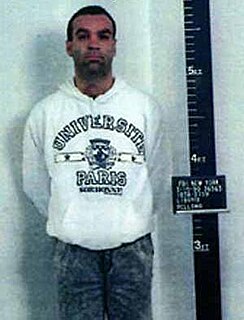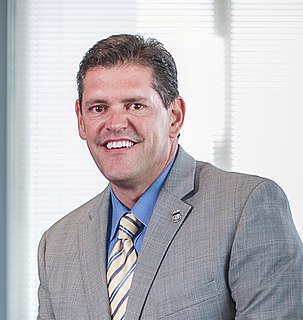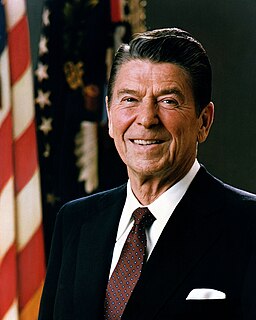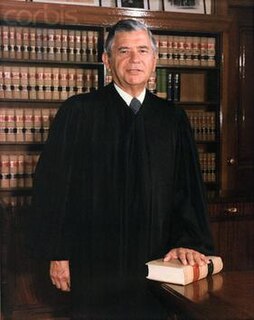Money laundering is the process of concealing the origins of money obtained illegally by passing it through a complex sequence of banking transfers or commercial transactions.

The Racketeer Influenced and Corrupt Organizations Act, commonly referred to as the RICO Act or simply RICO, is a United States federal law that provides for extended criminal penalties and a civil cause of action for acts performed as part of an ongoing criminal organization. The RICO Act focuses specifically on racketeering and allows the leaders of a syndicate to be tried for the crimes they ordered others to do or assisted them in doing, closing a perceived loophole that allowed a person who instructed someone else to, for example, murder, to be exempt from the trial because they did not actually commit the crime personally.

White-collar crime refers to financially motivated, nonviolent crime committed by businesses and government professionals. It was first defined by the sociologist Edwin Sutherland in 1939 as "a crime committed by a person of respectability and high social status in the course of their occupation". Typical white-collar crimes could include wage theft, fraud, bribery, Ponzi schemes, insider trading, labor racketeering, embezzlement, cybercrime, copyright infringement, money laundering, identity theft, and forgery. Lawyers can specialize in white-collar crime.
The United States Senate Caucus on International Narcotics Control was created to monitor and encourage the U.S. government and private programs seeking to expand international cooperation against drug abuse and narcotics trafficking, and promote international compliance with narcotics control treaties, including eradication.
In the United States, a Presidential Commission is a special task force ordained by the President to complete a specific, special investigation or research. They are often quasi-judicial in nature; that is, they include public or in-camera hearings.
The Permanent Subcommittee on Investigations (PSI), stood up in March 1941 as the "Truman Committee," is the oldest subcommittee of the United States Senate Committee on Homeland Security and Governmental Affairs.
A racket, according to the current common and most general definition, is an organized criminal act in which the criminal act is some form of substantial business, or a way to earn illegal money either regularly, or briefly but repeatedly. A racket is therefore generally a repeated or continuous criminal operation. However, originally and often still specifically, a “racket” referred to a criminal act in which the perpetrator or perpetrators fraudulently offer a service to solve a nonexistent problem, a service that will not be put into effect, or a service that would not exist without the racket. Conducting a racket is racketeering. Particularly, the potential problem may be caused by the same party that offers to solve it, but that fact may be concealed, with the specific intent to engender continual patronage for this party.
The Organized Crime Drug Enforcement Task Force is a federal drug enforcement program in the United States, overseen by the Attorney General and the Department of Justice. It primarily concerns itself with the disruption of major drug trafficking operations and related crimes, such as money laundering, tax and weapon violations, and violent crime. The task force was created in 1982, and employs approximately 2500 agents.
Vincent DiNapoli was a New York mobster and captain in the Genovese crime family, involved in labor racketeering. DiNapoli is best known for creating a cartel in the 1970s that controlled the price of drywall in New York City.

Liborio Salvatore Bellomo is an American mobster and reputed boss of the Genovese crime family.

Vincent James Squillante, a.k.a. Jimmy Jerome, was a New York mobster who belonged to the Gambino crime family and was known as "king of the garbage collection racket". Squillante also worked as an assassin for mob boss Albert "Mad Hatter" Anastasia.
James "Jimmy the Lapper" LaPietra (1927–1993) was a Chicago mobster and member of Chicago Outfit. He was also the younger brother of mobster Angelo "the Hook" LaPietra.
Matthew Madonna is the current street boss of the Lucchese crime family. Madonna was heavily involved in narcotics trafficking before being imprisoned. Currently Madonna is serving a prison sentence on gambling and bribery charges.
Louis DiNapoli is a New York City mobster and soldier in the Genovese crime family. DiNapoli grew up in the East Harlem section of Manhattan and became a made member of the Genovese family in the early 1980s, joining the 116th Street Crew, which was headed by his older brother Vincent DiNapoli. The crew was heavily involved in labor racketeering in the N.Y.C. District Council of Carpenters, and used its influence to extort money from New York construction companies and contractors.
Vincent "Fish" Cafaro was a mobster and protegee of Anthony "Fat Tony" Salerno, a top lieutenant in the Genovese crime family until becoming a government informant and witness.
The American Mafia or Italian-American Mafia is a highly organized Italian-American criminal society. The organization is often referred to by members as Cosa Nostra and by the government as La Cosa Nostra (LCN). The organization's name is derived from the original Mafia or Cosa nostra, the Sicilian Mafia, and it originally emerged as an offshoot of the Sicilian Mafia; however, the organization eventually encompassed or absorbed other Italian-American gangsters and Italian-American crime groups living in the United States and Canada that are not of Sicilian origin. It is often colloquially referred to as the Italian Mafia or Italian Mob, though these terms may also apply to the separate yet related Sicilian Mafia or other organized crime groups in Italy.
The illegal drug trade in Panama includes trans-shipment of cocaine to the United States. The 1989 United States invasion of Panama to topple Dictator Manuel Noriega was justified in part by the need to combat drug trafficking. Noriega, the dictator of Panama from 1983 to 1989, had a relationship with the U.S. Central Intelligence Agency (CIA) from the 1950s. More recently, Mexican cartels such as Sinaloa have been active in Panama.

James A. "Jim" Dinkins is an American law enforcement officer and business executive who was the first head of Homeland Security Investigations for US Immigration and Customs Enforcement, serving in that role from 2010 to 2014. He is currently senior vice president and director of operations of Enterprise Financial Crimes Compliance for US Bank.







